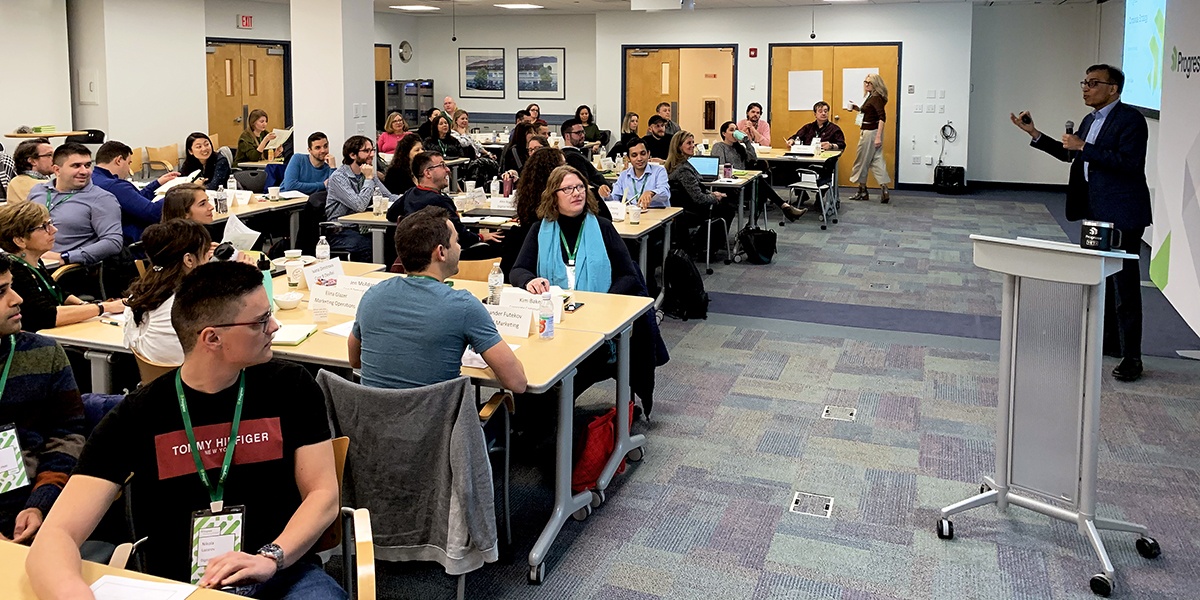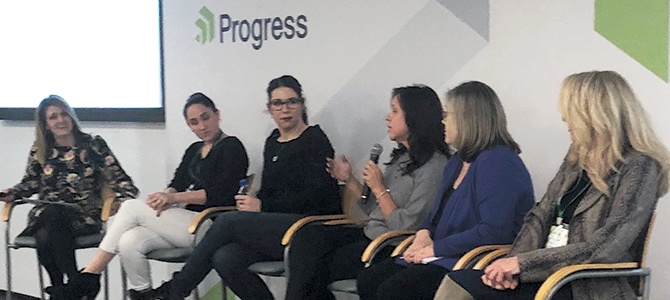Data and the Top Marketing and Operations Challenges of 2020

It’s not just you. Every marketing team struggles with what to do with its data. It’s 2020, why is this still a problem and how can we fix it?
You want to effectively collaborate, communicate and achieve your collective goals but you can’t tame your data.
What’s more, it’s not just how you share, monitor, measure, and act on your data, it’s how you align your goals across the department and stay on track.
Normally, I wouldn’t be able to share details about how the corporate marketing team here at Progress navigates these problems. But my team has partnered with marketing on a joint solution called Project WorkEasy to help overcome the top challenges.
Challenge 1: Collaboration – Sharing of Data / How and When
With multiple business lines with distinct requirements for corporate marketing, each line of business can feel out of the loop on the successes and failures across the company:
What is the best process to run an A/B test email?
What key metrics are measured for product line A that has low velocity lead flow versus product line B, which is high velocity lead flow?
What did business line A learn last week that business line B could use for an upcoming campaign?
One solution is to do a quarterly meeting where we share wins and losses. Another solution might be to set up monitoring and alerts across core marketing metrics when something works really well, or completely fails.
For example, I run product and digital marketing for the Cognitive First group at Progress, and we had an amazing MQL to SQL conversion rate that exceeded industry benchmarks by around 25% for a webinar contrasting popular cloud appdev platforms by our very credible developer relations team. What can others learn from this? How can I learn from others?
Challenge 2: Effectively Monitor, Measure and Act on Data
This one seems to be a trend for every company with expanding data volumes and martech stack creep. Getting to a perfectly clean, single view of a customer may never happen in complex environments, but there is a ton of potential for wins to make data actionable where it lives – versus waiting months to years for a shiny customer data platform.
Today, monitoring key metrics is a mix of marketing reports, business intelligence (BI) reports and native martech application capabilities across disparate sales and marketing systems. Finding actionable insights is an extremely manual process that does not scale, and it requires inspection across a combination of insights to respond to things like:
Funnel conversion trends not aligned with sales
Trends around sales activity and lead SLAs
Anomalies in lead volume due to exceptions in lead flow
Surge alerting for hot prospects based on engagement
ABM intent data from existing systems for lead scoring
Manual steps from A/B tests for paid ad performance
Many marketers at Progress said these manual tasks are time-consuming and do not scale, which inhibits their ability to deliver more innovation. The innovation I have seen in Progress marketing is exciting and you can often find them sharing best practices at industry events such as the upcoming Oracle Modern Customer Experience. Just imagine how much more we can deliver by removing the burden of manual work.
Challenge 3: Regular Status Updates for Annual Commitments
During a recent discussion about marketing blockers, Courtney from the social media team shared: “The corporate marketing team hears about amazing plans at beginning of year and then no further updates.” It’s a great observation. Are we on or off track to meet our key results? If we’re off track, how can I help? One option is to build dashboards for each goal, but this is yet another place I need to manually check so I would rather have the ability to subscribe to automated updates.
Waiting for updates till the end of the quarter is so 2019.

Progress VP of Marketing Jennifer Ortiz, far left, leads a discussion among marketing department leaders amid 2020 planning sessions.
Progress as a ‘Case Study’
These challenges came to the forefront during our marketing department’s two-day kickoff event and brainstorm sessions Jan. 6-7 at Progress headquarters in Bedford, Massachusetts. We’re a software company with about 1,800 employees in three distinct business segments, and a global leader whose mission is to simplify and enable development, management and deployment of business applications.
But our marketing goals probably sound a lot like your own
Ensure each member of marketing knows our corporate strategy, FY20 business priorities and plans
Ensure each member of marketing knows how marketing overall and their specific team contributes in to successfully executing on our company priorities and plans in FY20 to advance the customer journey
Create clearly defined priorities for FY20 for each part of marketing that are aligned with the business needs and plans and the broader marketing organization
Contribute to the team having the context needed to execute successfully in FY20 and be able to adapt in an agile and flexible way as the business needs adjust throughout the year
Foster relationship building to support ongoing collaboration across marketing
So, how will we (or you) get there?
Our Project WorkEasy solution, currently being incubated, aims to enable marketers to get self-service alerting across trends in marketing and sales data over SMS, email, Slack or Microsoft Teams.
The project is mostly unknown to the broader marketing team, so it was exciting for me to see that it can address many of the challenges that surfaced during our kickoff.
Automate Your Marketing Alerts along with Us
Based on some of our challenges with our own martech stack, the founding team for Project WorkEasy spoke to more than 100 marketing teams and is excited to have a solution ready for pilot based on those learnings. If your organization faces any or all of these challenges, check out our project page, sign up, or continue to tune in to track our project.

